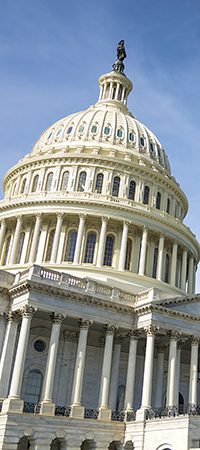A World Transformed
After the tumultuous events that erupted last year and continue to reshape our world, we need no reminder that we are living in an era of profound turbulence and historic change.
The deep and interconnected changes remaking our world demand bold action. Simply aiming to integrate elements of sustainability into a business’ core strategy is no longer sufficient.
For business, the call to action could not be clearer: resilient business strategies are more urgent than ever today and are the key to achieving value for all stakeholders in the long term. They will lead to nimbler and more innovative companies.
But it is not just about a process that drives company and stakeholder value. Resilient business strategies are an essential pathway to achieving a just world and an economy that delivers truly inclusive and sustainable prosperity.
We believe that the business and human rights field will benefit from a framework for the enjoyment, realization, and fulfillment of human rights—a shared opportunity to promote human rights—that moves beyond a perception that the UNGPs’ three pillars are solely about avoiding harm.
Why Resilience, and Why Now?
BSR presents this paper with three primary objectives:
1. To urge leaders to adopt resilient business strategies as an imperative for a transformed world
2. To shape a shared understanding of what resilience means for business and society
3. To catalyze action by defining the building blocks of resilient business strategies
Resilience is essential to the success of both business and society; each depends on the other. While connected, resilient business and resilient societies have different characteristics and contexts.
Resilience is deeply relevant to nearly every core business activity: product development, sourcing and procurement, human capital development, natural resource acquisition and use, financial capital deployment, and marketing and communications. Resilient business strategies are the best pathway for companies to compete and deliver value and for business and society to thrive.
The many shocks to the system that we have seen over the past year show the clear and urgent need to create more resilient societies. What’s more, as devastating as COVID-19 has been, we know that there are many other profound changes remaking our world, including technological advances, climate disruption, income inequality, deep systemic discrimination, and loss of faith in democracy. These fundamental changes should prompt a commitment to resilience to deliver shared prosperity, a healthy environment, and social cohesion. If they don’t, these and many other changes threaten to turn tensions into deep cleavages in society.
Finally, it is worth noting that the word “sustainability” has barely appeared in the text until now. This is deliberate. Of course, we still believe strongly that sustainability is a crucial driver of strategic advantage and is the best route to inclusive prosperity for all. As a matter of business activity, however, we believe that the focus on “integrating sustainability into business” has run its course. Integration perpetuates the idea that there is business in one category and a just and sustainable world in another. Instead, as stated above, we believe that resilient business strategies are essential for achieving thriving businesses and societies.
We believe that the focus on “integrating sustainability into business” has run its course. We believe that resilient business strategies are essential for achieving thriving businesses and societies.
How Do We Define Resilience?
Resilience, especially in the wake of COVID-19, has become a widely used term. It is also a widely misunderstood term. To clarify, we present a working definition that takes into account both business resilience and societal resilience. Our definitions build on many efforts undertaken by others in the interest of providing a baseline that companies can use to develop their strategies.
Resilient Business
A resilient business does three core things:
1. Anticipates material changes to the operating environment
2. Systemically develops and tests strategic plans in the context of such changes
3. Allocates resources and creates value in ways that enable success in multiple potential futures
Resilient businesses will be better prepared to capture strategic advantage and contribute to the realization of thriving societies.
All core activities of a resilient enterprise—from the boardroom to product development to procurement to community dialogue—consider their adaptability to changing circumstances. In the next section, we detail the many ways that specific business objectives, functions, and processes should be remade to achieve resilience.
Risk and resilience are often considered together, and there is no doubt that one crucial element of resilient business strategies is to minimize and manage risk. Indeed, a resilient business draws on—and strengthens—principles of enterprise risk management. However, resilient business strategies should also go beyond traditional models of enterprise risk. Managing risk can too often inspire a defensive mindset that misses one of the most valuable outcomes of resilience thinking: innovation that creates new business opportunities while simultaneously benefiting stakeholders and the environment.
What is the difference between enterprise risk management and resilience?
Enterprise risk management, as it has been defined traditionally, applied to natural resource constraints can lead to a race to secure scarce resources. Resilient business strategies call for a company to redesign products to use less. Reputational risk concerning labor abuses in the supply chain leads to massive investment in factory monitoring. Resilient business strategies would lead to incentives for suppliers to invest in workplaces that are both more productive and fairer. Political risk can lead to support for all political parties to hedge bets; resilient business strategies involve coalitions to advocate for systemic governance reforms. We do not believe that traditional enterprise risk management has no value—only that it should be redesigned in service of resilient business strategies that are likely to be more successful over time.
It is also important to state what resilience is not. First and foremost, resilience is not about a passive reaction to events. In fact, it is the opposite. Resilient business strategies are based on active foresight that is the foundation of decisive actions that enable the innovation needed to meet emerging needs and expectations. We believe that a resilient business will be more attractive to investors and employees, be better able to innovate, and have a strong license to operate in a world where expectations of business are rising.
Resilient Societies
Resilient societies have the capacity to anticipate and adapt to change and disruption in a way that enables human well-being, thriving and just institutions, full and equal participation in society and the economy, and preservation of the natural and built environment. A resilient society addresses systemic challenges, transforms them into opportunities, and does so with full and fair participation by all. This definition comes from the High-Level Political Forum on Sustainable Development.
Resilient business is hard to achieve in fragile societies. This has been a cardinal tenet of the sustainability world, expressed early on by UN Secretary General Kofi Annan, who famously said that “business cannot prosper in societies that fail.”
Societal resilience has many dimensions. The following categories of change are testing societal resilience in ways that are fundamentally important for business.

Environmental Disruption
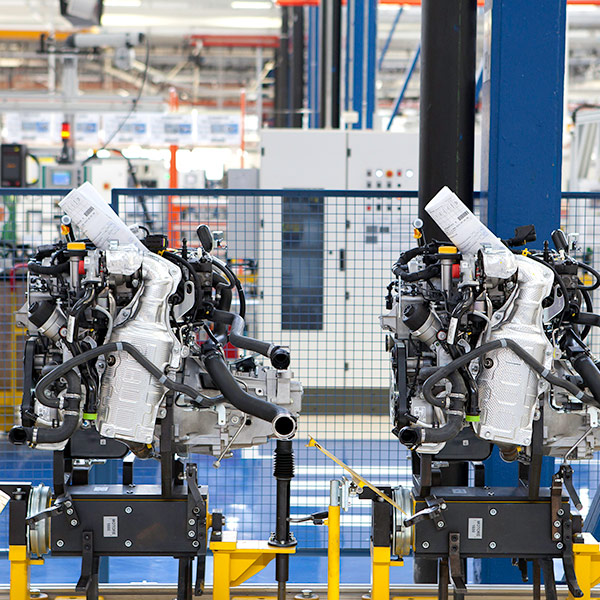
New Technologies
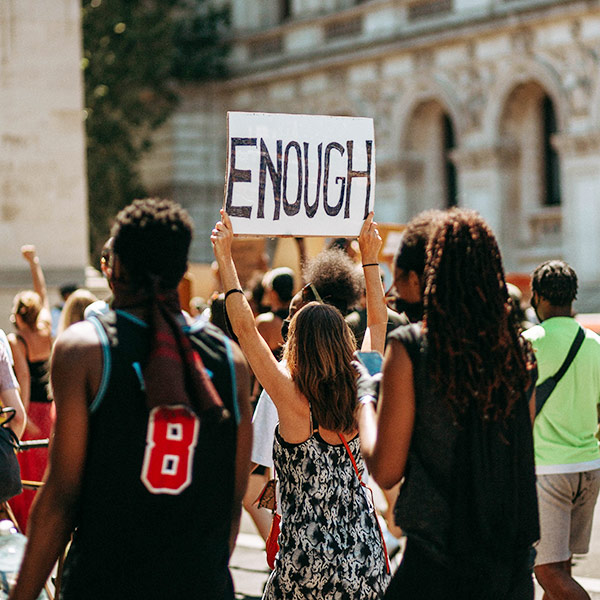
Political Dysfunction
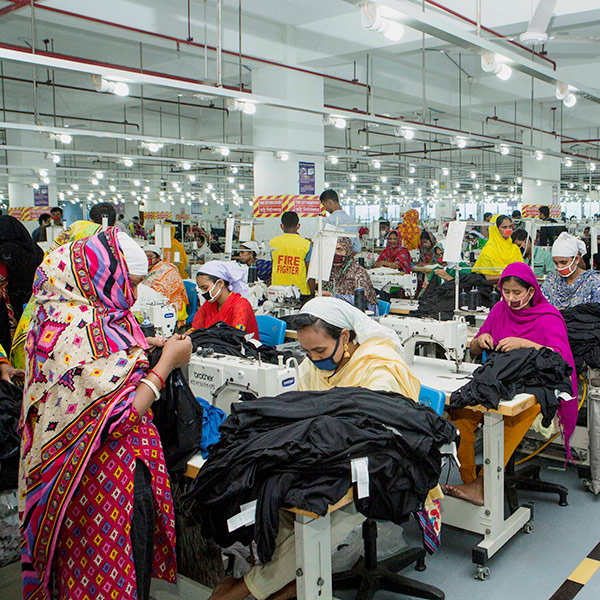
Diversity, Equity, and Inclusion (DEI)
Societal
Resilience
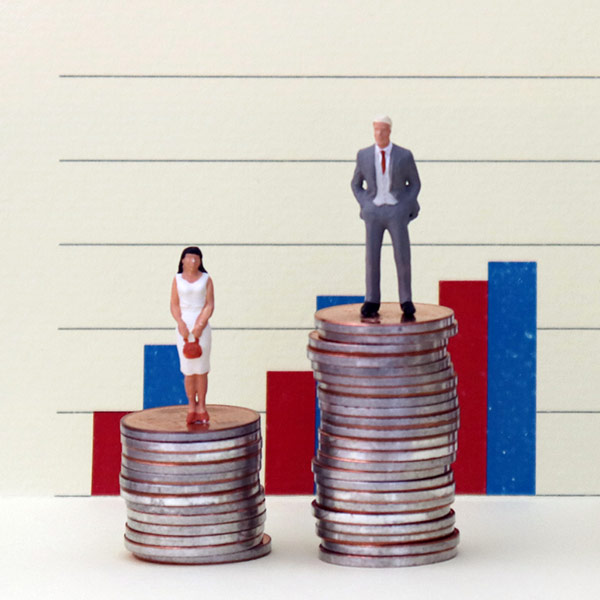
Income Inequality
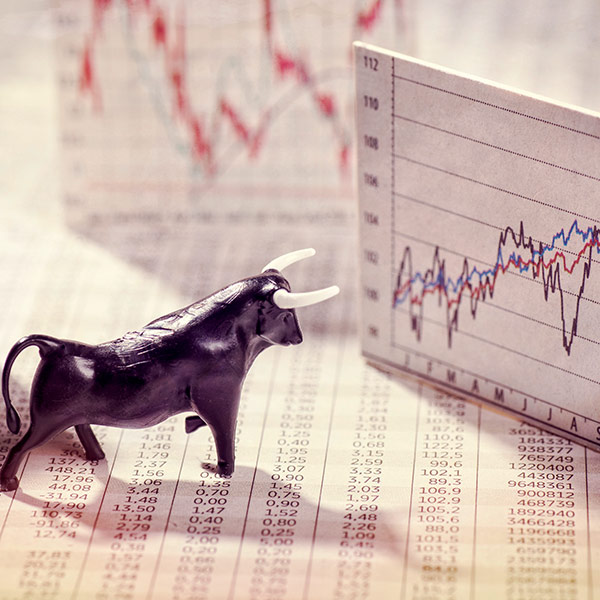
Social Contract Flaws
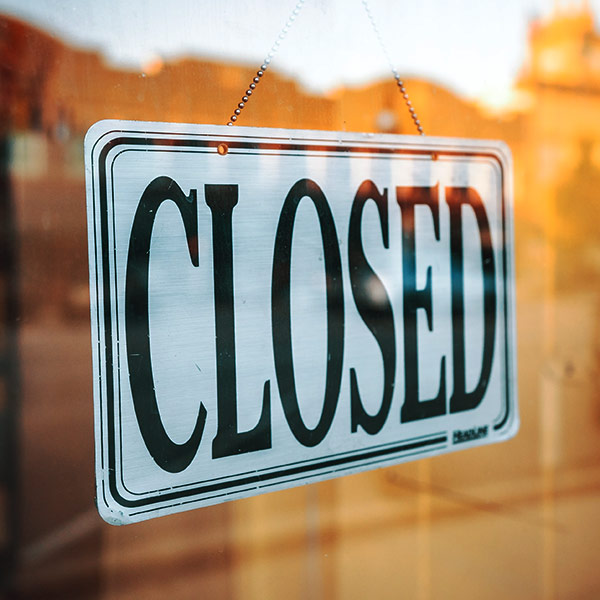
Decline of Legacy Businesses

Pace of Change
While resilient business and resilient societies are distinct, one cannot be achieved without the other. After all the economic, political, social, and health systems disruptions that hit the world hard in 2020 and continue to reverberate, this should be clearer than ever. Ultimately, resilience is a systems question. At its most basic level, for example, it does no good for a company to have resilient infrastructure if it is in a city prone to energy shortages or transportation failures. Companies will not capture the full value of their investment in people if educational systems are not doing an effective job of preparing people to participate in a changing world. And political dysfunction creates risks in financial systems that generate systemic instability.
While resilient business and resilient societies are distinct, one cannot be achieved without the other. After all the economic, political, social, and health systems disruptions that hit the world hard in 2020 and continue to reverberate, this should be clearer than ever.
Responding to the Challenge:
The Building Blocks of Resilient Business
Resilient business strategies call for a fresh look at many, if not all, elements of business. While a comprehensive treatment of all such steps is beyond the scope of this paper, we provide a set of steps and actions that companies can take to shift their efforts to achieve better outcomes: stronger businesses and stronger societies, evolving business models, and products and services that deliver value for all stakeholders.
We believe that resilience is more than a reactive approach to business. Indeed, we believe that these building blocks offer a foundation on which business can innovate, confident that it can achieve strategic advantage in a way that anticipates change, and can contribute to to the creation of resilient societies that enable people to thrive in a just and sustainable world.
The Building Blocks of Resilient Business
Please click on the building blocks below to learn more.
We believe that these building blocks offer a foundation on which business can innovate, confident that it can achieve strategic advantage in a way that anticipates change, and can contribute to the creation of resilient societies that enable people to thrive in a just and sustainable world.
Sustainability: The Foundation of Resilient Business Strategies
Resilient business strategies draw heavily on practices that have been introduced to companies through sustainability objectives and practices. As such, sustainability should be seen both as an outcome of resilient business strategies and as their foundation. There are many examples of such practices, but particularly important are listening to diverse perspectives, futures thinking, long-term value creation, and systems change.
Sustainability has introduced the concept of stakeholder dialogue to business, and diverse perspectives are needed for companies to develop resilient business strategies. And while stakeholder engagement has sometimes been seen as a matter of fairness or, let’s face it, the appeasement of critics, it is also just smart business.
Businesses too often make decisions in narrow echo chambers. Understanding the dynamics in the workplace will not happen without hearing perspectives from experts in DEI; leaders from excluded populations; or rising generations. Climate scientists have made room for themselves in Board deliberations. Disruptions in local communities are less likely when they have a voice that is heard when decisions are made. The point is simple: understanding a changing world will, by definition, be more achievable when listening to a diverse set of voices that are shaping, and that understand, new social and economic directions.
Sustainable development is also defined as preserving opportunities for future generations, and futures thinking is therefore essential to resilient business strategies. ESG investing focuses on long-term value, which further reinforces the importance of scenario planning, which strengthens resilience. This is illustrated by the reliance of the TCFD on scenarios for its framework.
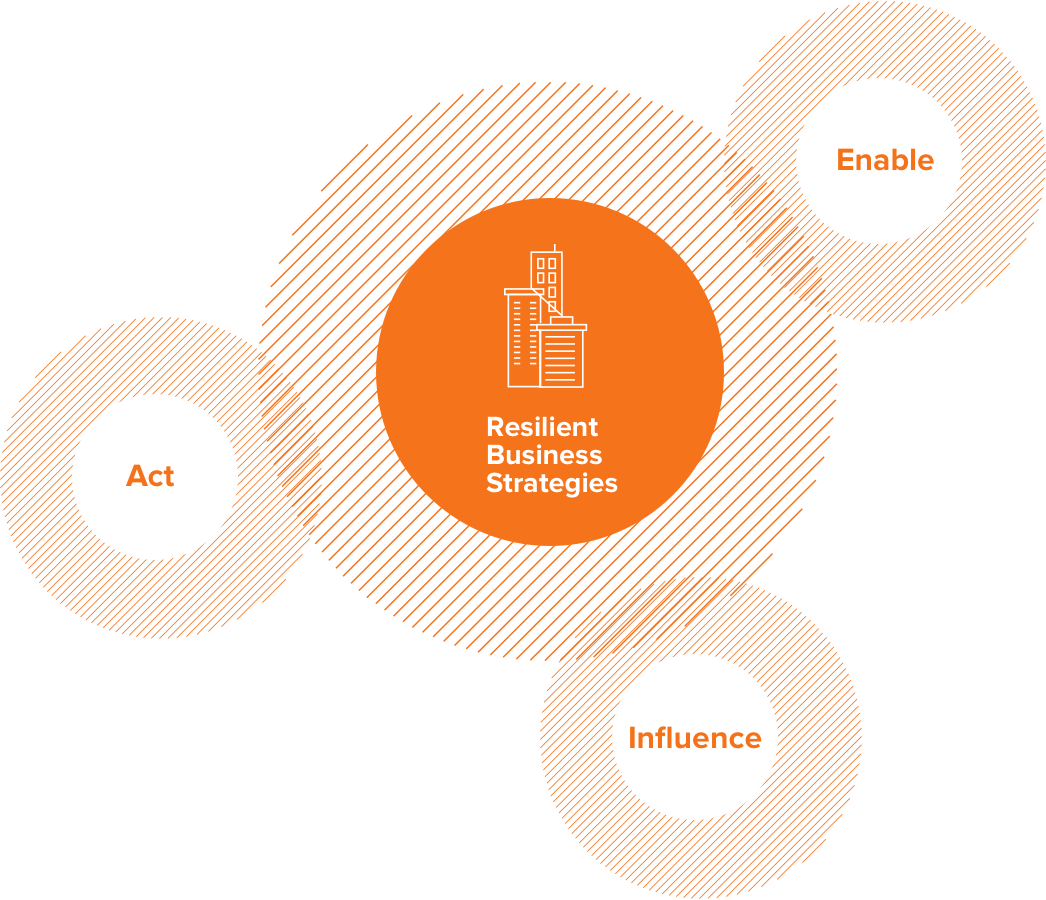
Systems thinking is also at the core of sustainability and is essential both for resilient business and societal resilience. We are seeing multiple systems—food systems, energy systems, and natural ecosystems—under threat and/or being disrupted. Societal resilience is impossible in this context, and so is resilient business, which both shapes and relies on such systems.
No business strategy reaches its potential in a world beset by extreme weather events, fragile infrastructure, endemic poverty, public health crises, systemic exclusion, political dysfunction, economic dislocation, and frayed social safety nets.
Sustainability thinking has long focused on shifting systems. BSR’s “act, enable, and influence” framework is based on the belief that companies are likeliest to achieve their sustainability objectives when they exert leadership in three dimensions: acting within their own boundaries, enabling collective action within ecosystems such as value chains and industry groups, and applying their influence to ensure that public policy and financial incentives are aligned with sustainability leadership. This same thinking is supremely relevant to resilient business strategies. All this shows that the core skills of sustainability teams and the Chief Sustainability Officer (CSO) add distinct value when creating resilient business strategies.
Photo credits: Nik Ramzi Nik Hassan; Johannes Plenio; Max LaRochelle; Liam Edwards; and Leon.
Systems thinking is also at the core of sustainability and is essential both for resilient business and societal resilience.
Let’s talk about how BSR can help you to transform your business and achieve your sustainability goals.










